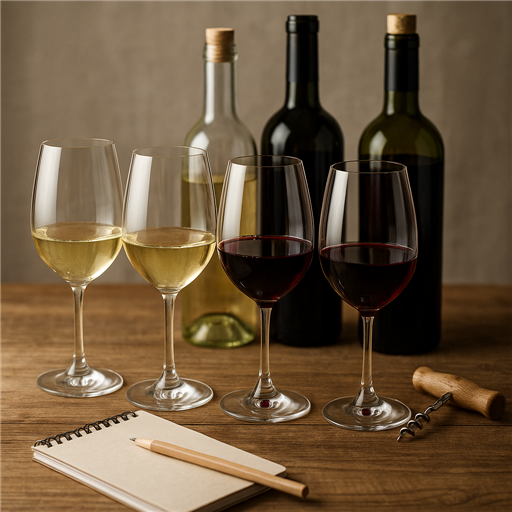
Introduction
The Importance of Hosting a Wine Tasting
At Viniou, we understand that organising a wine tasting is not just about sampling different vintages—it's an opportunity to deepen our connection with the wine itself and the people who share our passion. Hosting a wine tasting, whether you're new to the world of wine or a seasoned enthusiast, is an enriching experience that allows us to explore and appreciate the subtleties of various wine profiles. It unites friends and introduces us to new acquaintances, creating bonds over shared discoveries. Additionally, a well-structured tasting enhances our sensory skills, honing the ability to detect flavours and aromas that might otherwise be overlooked. By hosting your own event, you not only grow your knowledge but also share in the joy and tradition that wine culture brings. Together, let's explore the art and pleasure of wine tasting.
Benefits of a Small Wine Tasting Event
Imagine inviting friends or fellow wine enthusiasts into a cosy atmosphere where you can intimately explore the nuances of different wines—this is the charm of organising a small wine tasting event. By keeping the gathering personal, we create an environment that fosters meaningful discussions and enriches our understanding of both the wines and each other. Small wine tastings allow us to savour each pour, appreciate subtle flavours, and engage in a shared journey of discovery. There's something special about connecting over a glass, where the focus isn't just on the wine but also on enjoying the company. Together, we delve deeper, learn, and perhaps find new favourites along the way—all without the overwhelm of larger, more impersonal events. It's a moment to pause, taste, and truly enjoy.
Planning Your Wine Tasting Event
Setting a Theme for Your Tasting
Setting a theme for your wine tasting is a delightful way to add focus and excitement to your event. It helps guide your selection of wines and ensures your guests have a memorable and cohesive experience. Whether you choose a regional theme, such as wines from Bordeaux, or opt for a varietal focus like Pinot Noir from various regions, having a theme provides a narrative that links the wines. This approach not only enhances your guests' enjoyment but also enriches their understanding of different wine styles. Remember, a well-chosen theme can also spark engaging conversations and bring an educational twist to your gathering. So, take a moment to think about what excites you most in wine, and let that inspiration guide your theme selection.
Selecting the Right Wines
When it comes to selecting the right wines for your small tasting event, diversity is key. This doesn't mean you need an extensive collection; instead, aim for a balanced selection that offers a journey through flavours and styles. Consider choosing wines from various regions or grape varieties to create an engaging experience. You might start with a refreshing Sauvignon Blanc, then explore a bold Cabernet Sauvignon, and perhaps conclude with a sweet Moscato. As you make your selections, think about the preferences of your guests and encourage them to try something new. Remember, our goal is to create a memorable and enjoyable experience for everyone. Cheers to you for embarking on this vinous adventure!

Preparing for the Wine Tasting
Creating the Perfect Atmosphere
Creating the perfect atmosphere for your wine tasting is essential to ensure a memorable experience. Start by setting the mood with soft lighting; candles or dimmable lights work wonders. Choose a playlist that complements the theme of your tasting—something mellow like classical or smooth jazz can enhance the tasting experience without overwhelming it. Additionally, think about the seating arrangement: it should be informal to facilitate conversation and interaction among guests. A round table or a relaxed lounge area offers comfort and easy access to the wines. To add a personal touch, consider printed menus or tasting notes that guests can refer to throughout the event. Ultimately, the goal is to create a welcoming environment where everyone feels at ease, allowing them to fully savour the wines you’ve selected.
The Ideal Tasting Sequence
When organising a small wine tasting, setting the ideal tasting sequence is crucial for a delightful experience. We recommend starting with lighter wines, such as a crisp Sauvignon Blanc or a gentle Chardonnay, to awaken your palate without overwhelming it. As the tasting progresses, move towards more complex whites like an oaked Chardonnay, before transitioning to the reds. Begin with lighter reds, such as a Pinot Noir, then advance to more robust varieties like a full-bodied Cabernet Sauvignon. This thoughtful progression not only prevents palate fatigue but also allows each wine's unique characteristics to shine. Remember, it's about savouring each sip, enhancing your appreciation of the diverse world of wine.
Providing Palate Cleansers and Snacks
When organising a wine tasting, it's crucial to consider the role of palate cleansers and snacks. They not only refresh your taste buds between sips but also enhance the overall experience. We recommend offering simple options such as plain crackers or bread, ensuring they are unsalted so as not to overshadow the wines. For snacks, consider mild cheeses, nuts, or fruits like apple slices, which can complement the flavours of the wines you're serving. By providing these carefully chosen accompaniments, you help refine your guests' palates, allowing them to savour each wine more fully and appreciate the intricate differences. Ultimately, catering to both wine and food lovers enhances the sense of camaraderie and enjoyment at your tasting event.
During the Wine Tasting
Engaging Your Guests
During the wine tasting, engaging your guests is key to creating a memorable experience. Begin by encouraging everyone to share their thoughts on each wine; this not only sparks lively conversation but also helps deepen everyone's understanding. Introduce games or quizzes related to wine, tantalising both their knowledge and taste buds. Suggest they jot down notes, capturing their sensory impressions and personal preferences. Don't hesitate to share your own insights, but also be open to learn from each other's discoveries. Remember, our aim is to build a convivial atmosphere where curiosity and passion for wine flourish. By fostering an inclusive environment, you’ll ensure everyone feels comfortable and eager to contribute, transforming your wine tasting into a shared journey of exploration and enjoyment.
Encouraging Notes and Discussions
During your wine tasting, encouraging notes and discussions can significantly enhance the experience for everyone involved. We suggest providing each participant with a tasting sheet to jot down their thoughts on the aroma, flavour, and overall impression of each wine. This not only helps in organising individual impressions but also serves as a fantastic conversation starter. When you're ready to discuss as a group, ask open-ended questions like, "What unexpected flavours did you notice?" or "How does this wine compare to others you’ve tried?" These prompts can stimulate lively conversations and personal insights, inviting everyone to share and learn from one another. Remember, a wine tasting isn’t just about the wine; it’s about the stories and exchanges that stem from each sip. So, create an atmosphere where everyone feels comfortable voicing their observations, whether they’re seasoned oenophiles or beginners just discovering their palate.
Post-Tasting Tips
Collecting Feedback and Experiences
Once your delightful wine tasting has concluded, gathering feedback is an essential step in enhancing future events. Encouraging your guests to share their impressions can provide invaluable insights. Consider preparing a simple feedback form, either online or printed, with questions about their favourite wine, any surprising finds, and overall experience. This not only invites engagement but also helps you as a host to understand preferences and refine your selections for next time. Creating a relaxed environment for open discussion can also stimulate spontaneous conversations, enriching the experience for everyone. Remember, listening to your guests' experiences fosters a sense of community and ensures that each tasting becomes a memorable journey for all involved.
Following Up with Guests
Once the glasses are empty and the bottles are corked, the real magic begins—following up with your guests. A sincere and timely thank-you message can enhance the bond shared over the tasting experience. We suggest sending a personalised note or email within a day or two. Express your gratitude for their presence and perhaps share a few highlights of the evening. You might even invite them to share their own thoughts on the wines tasted. This can prompt engaging conversations and provide valuable insights for future tastings. Encourage your guests to join your community on platforms like Viniou, where they can keep track of their favourites and explore new recommendations. It's these gestures that transform a simple wine tasting into an ongoing journey of discovery together.
Conclusion
Inviting Users to Download Viniou
As we wrap up our journey into organising a small wine tasting, we understand the importance of having a reliable companion in your wine adventures. That's why we invite you to download Viniou, your ultimate tool for managing and enhancing your wine collection experience. Whether you're a beginner just starting to explore the world of wines or a seasoned connoisseur looking for precision and insight, Viniou can transform the way you handle your wine range. Its intuitive features make tracking, cataloguing, and discovering new wines a breeze. Join our community of wine enthusiasts by integrating Viniou into your tasting rituals and see how it elevates every sip. Cheers to more memorable wine tastings with Viniou by your side!